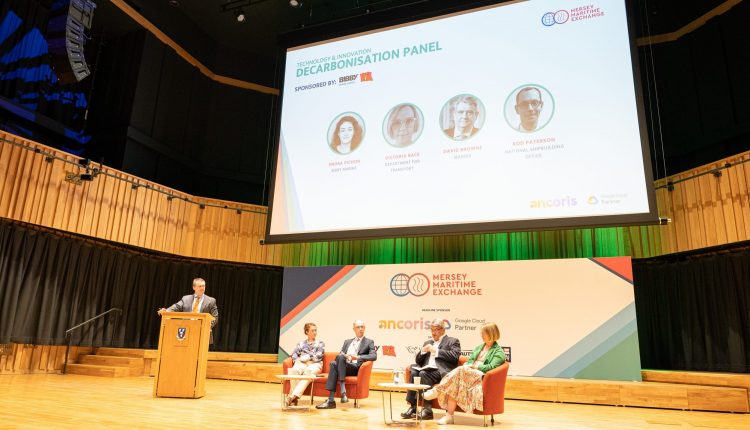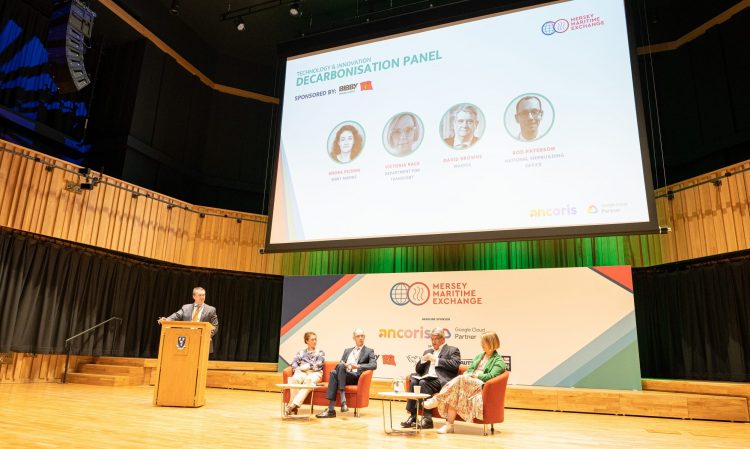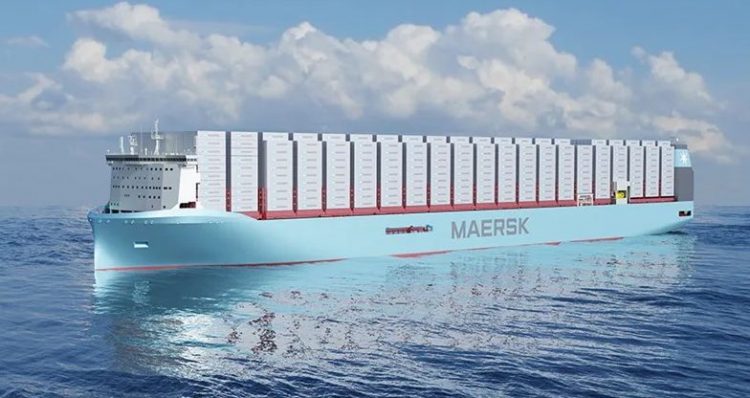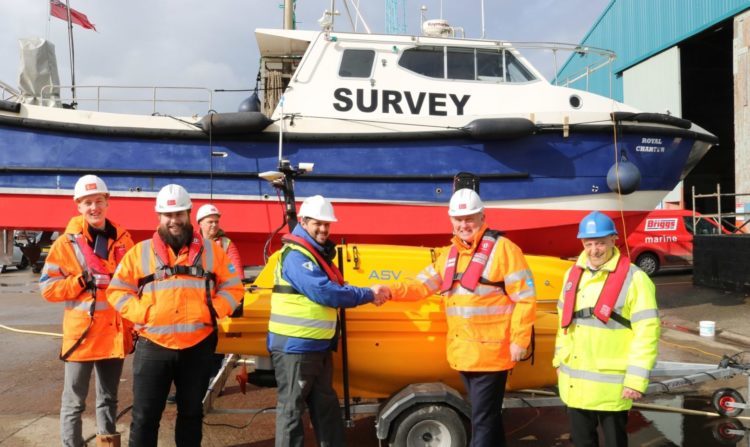
‘Decarbonisation is now our biggest challenge’
Decarbonisation and the race to combat climate change is now ‘our biggest challenge’, a senior civil servant tells maritime industry leaders in Liverpool, but adds ‘Government alone cannot solve this problem’. Tony McDonough reports

Decarbonisation and the battle against climate change will only be achieved by a global effort – and “the UK can lead the world”.
That is the view of Victoria Race, deputy director of maritime policy at the Department for Transport, who opened the first panel session at the Maritime Exchange conference at the Tung Auditorium in Liverpool.
Chaired by Mersey Maritime chief executive Chris Shirling-Rooke, the decarbonisation panel was one of two panel sessions in the morning of the event under the technology and innovation banner.
Also on the panel was David Browne, general manager at shipping and logistics giant Maersk, Rod Paterson, deputy director of the National Shipbuilding Office and Enora Pichon, an innovation engineer at Bibby Marine.
Victoria Race said: “Decarbonisation is now our biggest challenge… UK SHORE (a £206m project to support maritime industry innovation) and the Clean Maritime Challenge has shown the importance of a joint approach.
“Projects are match funded… Government alone cannot solve this problem. We need industry to join us as well. This is a global effort to decarbonise, and the UK can lead the way on this.”
David Browne talked about the efforts Maersk was making towards its own goals of becoming a net zero carbon business by 2040. It services 100,000 customers in more than 130 countries by road, sea, air and rail.
This year will see the first of a new fleet of methanol-powered container vessels. The company is also retrofitting an existing container vessel to be powered by alternative fuels.
However, he warned that while many areas of industry were investing in decarbonisation there were businesses “on the periphery”. He urged those present to put pressure on their own suppliers and customers to join the push.
“We have to make progress in this decade. The challenges are substantial. If we want everyone to get behind it, then we have to create a level playing field. The pressure needs to come from consumers – and I don’t necessarily mean the end consumer but from freight consumers.

Rod Paterson said decarbonisation was “fundamental” to the work of the National Shipbuilding Office. He said it was not just concerned with bigger ships but was focused on all aspects of the supply chain and on aspects such as offshore wind.
He also said it was important to be open about the scale of finance that will be required to get the maritime sector to net zero by 2050.
“I’ve heard figures talked about in the region of £75bn over the next 30 years. UK SHORE has been phenomenally successful but it is not yet at the scale or magnitude of what is needed.
“We do need to look at different forms of. There is a Government spending review on the horizon and it is critical we build on the success of UK SHORE.”
Based in Liverpool, Bibby Marine has itself been the recipient of Government support as it looks to develop net zero offshore support vessels for the offshore wind and energy sectors.
Enora Pichon talked about the need to look beyond just building the vessels. She added: “We need to look at things such as charging points in ports. It is easy to demonstrate the concept but in order to move forward we need to take a holistic approach”.
Digitisation panel
“Joining the dots” between all players and stakeholders in the maritime sector was key to successfully introducing cutting edge technology such as AI into the maritime sector.
This was one of one of the major themes raised in the digitisation panel at the Exchange – the second panel of the day.
Taking part in the discussion was Matt Frank, chief AI officer at Ancoris, the headline sponsor of the conference, Mark Rathbone, a corporate partner at law firm Brabners and one of founders of the LCR Angel Network, Gary Doyle, Group Harbour Master at Peel Ports, and Richard Willis, a technical director from civil engineering firm Royal HaskoningDHV.
Ruth Wood, who will take over as interim chief executive of Mersey Maritime on July 1, chaired the panel.
Matt Frank remarked how impressed he was with the “confluence” of different players – business, local government, central government, academia and the military – that had gathered for the conference.
“In this country we have the UK’s historic maritime capabilities and the UK also has capabilities in technology and AI. Google has several thousand engineers across the country,” he said.
“We need to think deeply about supply chains… it is about bringing different suppliers into those supply chains – about taking a more holistic approach.”
He added that although everyone agreed that we needed to digitise there was not yet a common definition of the term. He explained: “It means different things to different industries at different times.”
The key, he explained, was not to start with the technology but to first identify what you are trying to achieve – “don’t go too big too quickly”.
“There is also a massive skills challenge. Infrastructure is important but we cannot do it without the skills,” he said.
And referring to AI, Matt said that we needed now to look beyond traditional AI into what is known as ‘generative AI’. This is AI that learns the structure of its inputted data and then is able to independently generate new data and content.
Gary Doyle said Peel Ports, which is the UK’s second-biggest port operator, had made big progress in using technology to centralise all its port operations in Liverpool.
“We fused our operations into one control centre. That did have its challenges and one of the problems we encountered was the loss of mobile phone signals at some locations.”
He also talked about the development opportunities for autonomous vessels, something Peel Ports had already started to deploy. Gary added: “We are nicely placed right on the Atlantic and we have to ask where that is going next.”

Richard Willis also referred to autonomous vehicles on port estates. For the first time, he explained, such vehicles weren’t just “operating behind a fence” but were now being used in the same space as vehicles being driven by people.
“That is starting to become commonplace,” he added. “And the need for climate resilience and decarbonisation will mean we need more data and tools and that will impact ports even more.
“We work for ports all over the world and the push for both digitisation and decarbonisation is strong. Collaboration can be difficult in parts and we need to break down that mindset and persuade people to see the big picture.”
As well as helping to set up the LCR Angel Network, Mark Rathbone has played a role in establishing Baltic Ventures, a new business accelerator in Liverpool that is looking to attract outside investors for fledgling Liverpool City Region tech businesses.
“It is important to change the way we do things and be open to new adaptations. And we cannot just rely on the larger corporates to innovate – in fact they often struggle to be truly innovative.
“We need to encourage that among early-stage businesses… What we have been trying to do in the Liverpool city region is grow that ecosystem because that has been lacking.”
